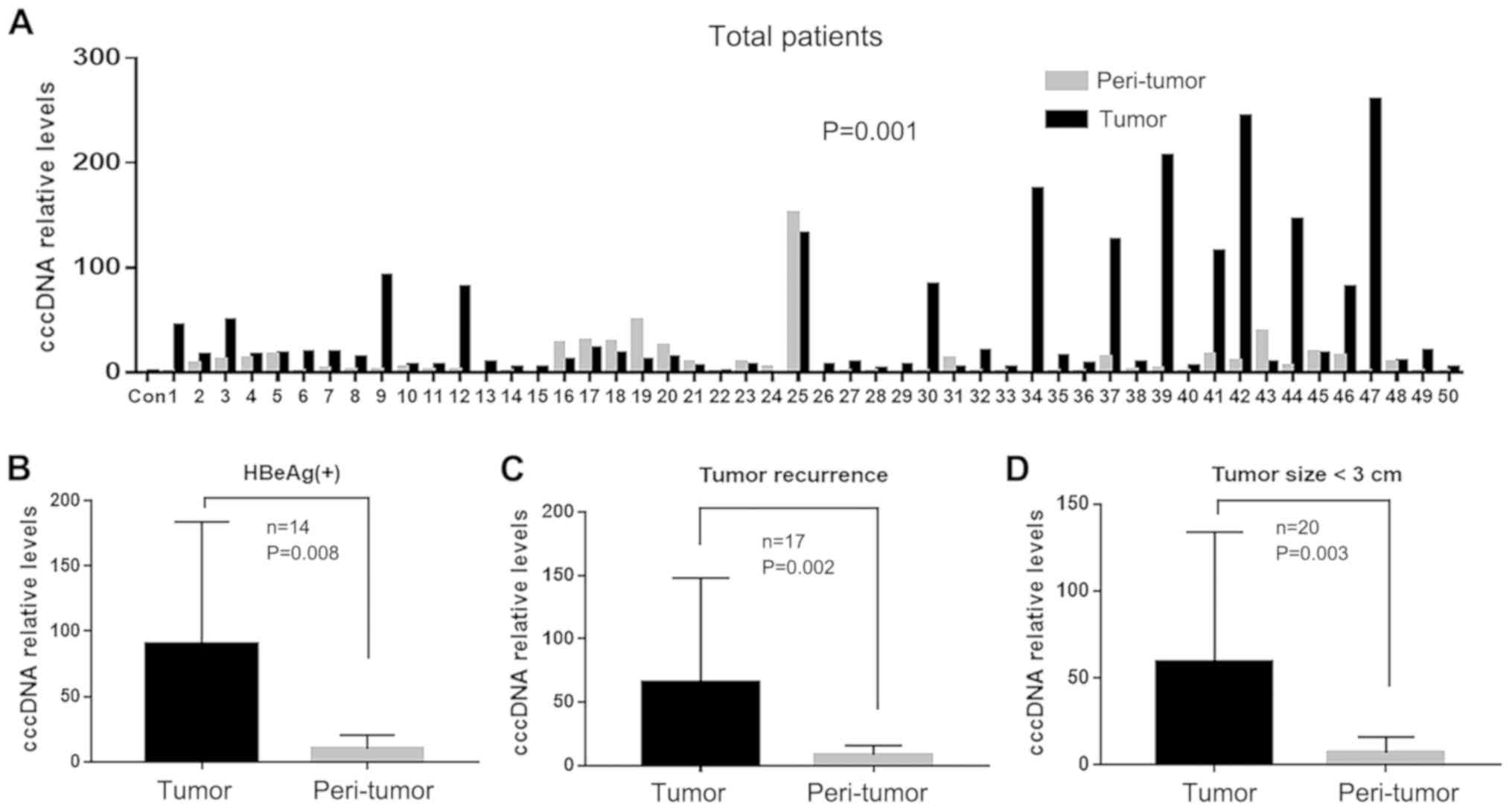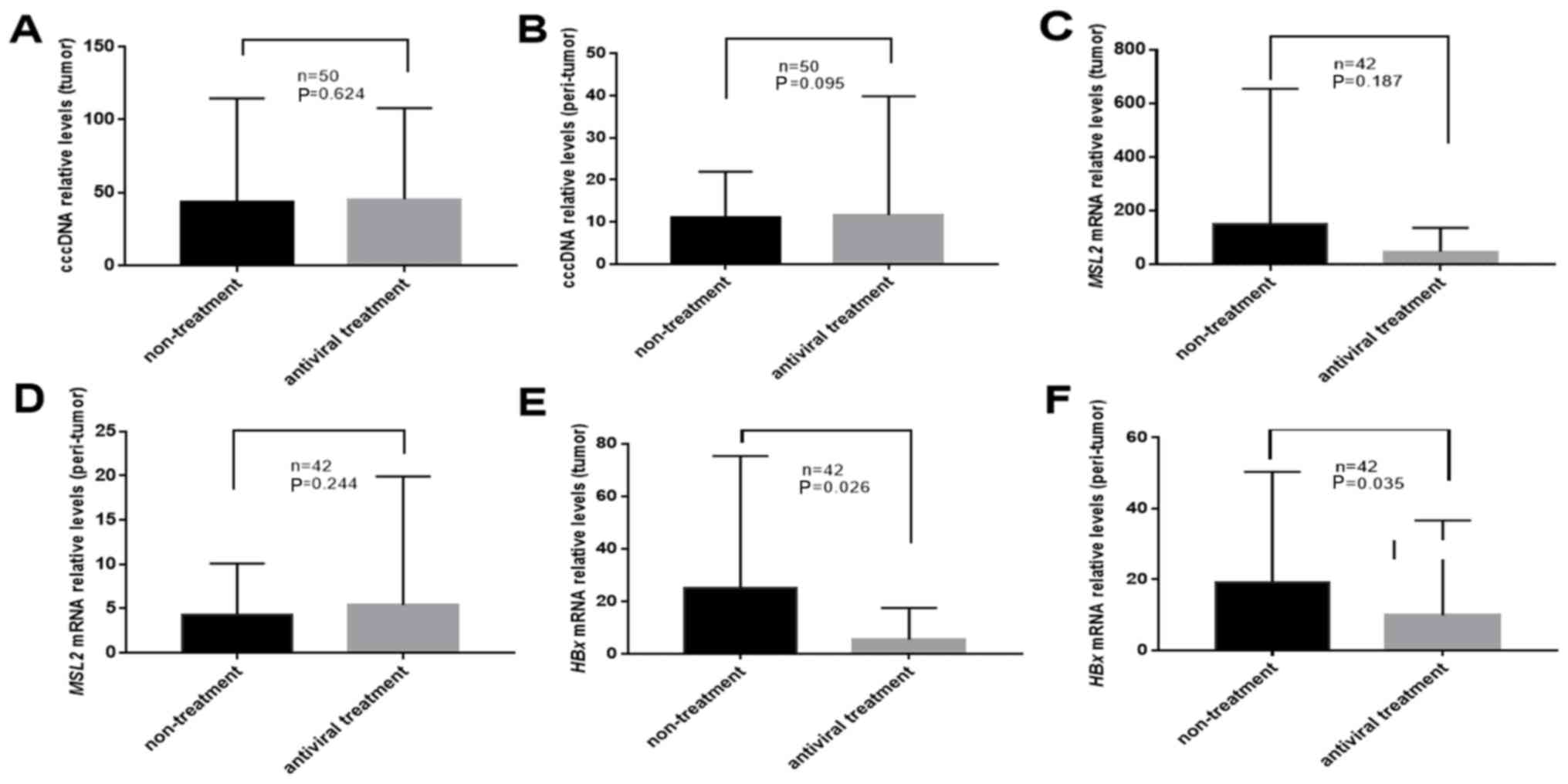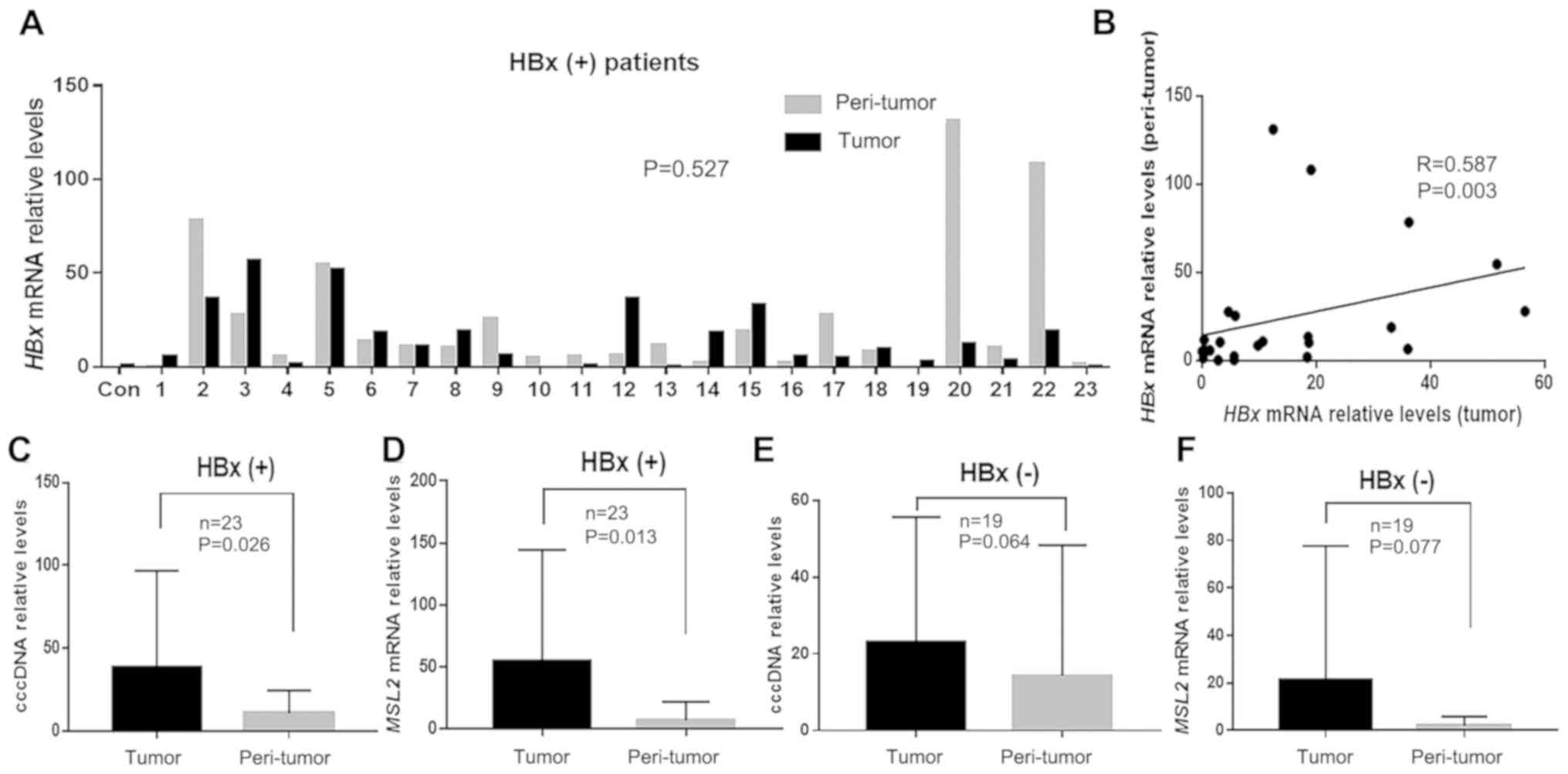|
1
|
Aljarbou AN: The emergent concern of
Hepatitis B globally with special attention to Kingdom of Saudi
Arabia. Int J Health Sci (Qassim). 7:333–340. 2013. View Article : Google Scholar : PubMed/NCBI
|
|
2
|
Allweiss L and Dandri M: The role of
cccDNA in HBV maintenance. Viruses. 9(pii): E1562017. View Article : Google Scholar : PubMed/NCBI
|
|
3
|
Lupberger J and Hildt E: Hepatitis B
virus-induced oncogenesis. World J Gastroenterol. 13:74–81. 2007.
View Article : Google Scholar : PubMed/NCBI
|
|
4
|
Blum HE: Hepatocellular carcinoma: Therapy
and prevention. World J Gastroenterol. 11:7391–7400.
2005.PubMed/NCBI
|
|
5
|
Wu M, Li J, Yue L, Bai L, Li Y, Chen J,
Zhang X and Yuan Z: Establishment of Cre-mediated HBV recombinant
cccDNA (rcccDNA) cell line for cccDNA biology and antiviral
screening assays. Antiviral Res. 152:45–52. 2018. View Article : Google Scholar : PubMed/NCBI
|
|
6
|
Mazet-Wagner AA, Baclet MC, Loustaud-Ratti
V, Denis F and Alain S: Real-time PCR quantitation of hepatitis B
virus total DNA and covalently closed circular DNA in peripheral
blood mononuclear cells from hepatitis B virus-infected patients. J
Virol Methods. 138:70–79. 2006. View Article : Google Scholar : PubMed/NCBI
|
|
7
|
Wong DK, Yuen MF, Yuan H, Sum SS, Hui CK,
Hall J and Lai CL: Quantitation of covalently closed circular
hepatitis B virus DNA in chronic hepatitis B patients. Hepatology.
40:727–737. 2004. View Article : Google Scholar : PubMed/NCBI
|
|
8
|
Ng SA and Lee C: Hepatitis B virus X gene
and hepatocarcinogenesis. J Gastroenterol. 46:974–990. 2011.
View Article : Google Scholar : PubMed/NCBI
|
|
9
|
Zhang X, Zhang H and Ye L: Effects of
hepatitis B virus X protein on the development of liver cancer. J
Lab Clin Med. 147:58–66. 2006. View Article : Google Scholar : PubMed/NCBI
|
|
10
|
Ding R, Han S, Lu Y, Guo C, Xie H, Zhang
N, Song Z, Cai L, Liu J and Dou K: Overexpressed Id-1 is associated
with patient prognosis and HBx expression in hepatitis B
virus-related hepatocellular carcinoma. Cancer Biol Ther.
10:299–307. 2010. View Article : Google Scholar : PubMed/NCBI
|
|
11
|
Rabut G and Peter M: Function and
regulation of protein neddylation. ‘Protein modifications: Beyond
the usual suspects’ review series. EMBO Rep. 9:969–976. 2008.
View Article : Google Scholar : PubMed/NCBI
|
|
12
|
Villa R, Forne I, Muller M, Imhof A,
Straub T and Becker PB: MSL2 combines sensor and effector functions
in homeostatic control of the Drosophila dosage compensation
machinery. Mol Cell. 48:647–654. 2012. View Article : Google Scholar : PubMed/NCBI
|
|
13
|
Gao Y, Feng J, Yang G, Zhang S, Liu Y, Bu
Y, Sun M, Zhao M, Chen F, Zhang W, et al: Hepatitis B virus X
protein-elevated MSL2 modulates hepatitis B virus covalently closed
circular DNA by inducing degradation of APOBEC3B to enhance
hepatocarcinogenesis. Hepatology. 66:1413–1429. 2017. View Article : Google Scholar : PubMed/NCBI
|
|
14
|
Bowden S, Jackson K, Littlejohn M and
Locarnini S: Quantification Of HBV covalently closed circular DNA
from liver tissue by real-time PCR. Methods Mol Med. 95:41–50.
2004.PubMed/NCBI
|
|
15
|
Livak KJ and Schmittgen TD: Analysis of
relative gene expression data using real-time quantitative PCR and
the 2(-Delta Delta C(T)) method. Methods. 25:402–408. 2001.
View Article : Google Scholar : PubMed/NCBI
|
|
16
|
Duan BW, Lu SC, Lai W, Liu XE and Liu Y:
The detection of (total and ccc) HBV DNA in liver transplant
recipients with hepatitis B vaccine against HBV reinfection. Hum
Vaccin Immunother. 11:2490–2494. 2015. View Article : Google Scholar : PubMed/NCBI
|
|
17
|
Kim JW, Lee SH, Park YS, Hwang JH, Jeong
SH, Kim N and Lee DH: Replicative activity of hepatitis B virus is
negatively associated with methylation of covalently closed
circular DNA in advanced hepatitis B virus infection.
Intervirology. 54:316–325. 2011. View Article : Google Scholar : PubMed/NCBI
|
|
18
|
Schreiner S and Nassal M: A role for the
Host DNA damage response in hepatitis B virus cccDNA formation-and
beyond? Viruses. 9(pii): E1252017. View
Article : Google Scholar : PubMed/NCBI
|
|
19
|
Fu S, Li N, Zhou PC, Huang Y, Zhou RR and
Fan XG: Detection of HBV DNA and antigens in HBsAg-positive
patients with primary hepatocellular carcinoma. Clin Res Hepatol
Gastroenterol. 41:415–423. 2017. View Article : Google Scholar : PubMed/NCBI
|
|
20
|
Chuaypen N, Sriprapun M, Praianantathavorn
K, Payungporn S, Wisedopas N, Poovorawan Y and Tangkijvanich P:
Kinetics of serum HBsAg and intrahepatic cccDNA during pegylated
interferon therapy in patients with HBeAg-positive and
HBeAg-negative chronic hepatitis B. J Med Virol. 89:130–138. 2017.
View Article : Google Scholar : PubMed/NCBI
|
|
21
|
Pichoud C, Berby F, Stuyver L, Petit MA,
Trepo C and Zoulim F: Persistence of viral replication after
anti-HBe seroconversion during antiviral therapy for chronic
hepatitis B. J Hepatol. 32:307–316. 2000. View Article : Google Scholar : PubMed/NCBI
|
|
22
|
Roche B, Feray C, Gigou M, Roque-Afonso
AM, Arulnaden JL, Delvart V, Dussaix E, Guettier C, Bismuth H and
Samuel D: HBV DNA persistence 10 years after liver transplantation
despite successful anti-HBS passive immunoprophylaxis. Hepatology.
38:86–95. 2003. View Article : Google Scholar : PubMed/NCBI
|
|
23
|
Suzuki F, Miyakoshi H, Kobayashi M and
Kumada H: Correlation between serum hepatitis B virus core-related
antigen and intrahepatic covalently closed circular DNA in chronic
hepatitis B patients. J Med Virol. 81:27–33. 2009. View Article : Google Scholar : PubMed/NCBI
|
|
24
|
Chauhan R, Lingala S, Gadiparthi C, Lahiri
N, Mohanty SR, Wu J, Michalak TI and Satapathy SK: Reactivation of
hepatitis B after liver transplantation: Current knowledge,
molecular mechanisms and implications in management. World J
Hepatol. 10:352–370. 2018. View Article : Google Scholar : PubMed/NCBI
|
|
25
|
Song GW, Ahn CS, Lee SG, Hwang S, Kim KH,
Moon DB, Ha TY, Jung DH, Park GC, Kang SH, et al: Correlation
between risk of hepatitis B virus recurrence and tissue expression
of covalently closed circular DNA in living donor liver transplant
recipients treated with high-dose hepatitis B immunoglobulin.
Transplant Proc. 46:3548–3553. 2014. View Article : Google Scholar : PubMed/NCBI
|
|
26
|
Nguyen MH and Keeffe EB: Are hepatitis B e
antigen (HBeAg)-positive chronic hepatitis B and HBeAg-negative
chronic hepatitis B distinct diseases? Clin Infect Dis.
47:1312–1314. 2008. View
Article : Google Scholar : PubMed/NCBI
|
|
27
|
Ganem D and Prince AM: Hepatitis B virus
infection-natural history and clinical consequences. N Engl J Med.
350:1118–29. 2004. View Article : Google Scholar : PubMed/NCBI
|
|
28
|
Wang Q, Lin L, Yoo S, Wang W, Blank S,
Fiel MI, Kadri H, Luan W, Warren L, Zhu J and Hiotis SP: Impact of
non-neoplastic vs intratumoural hepatitis B viral DNA and
replication on hepatocellular carcinoma recurrence. Br J Cancer.
115:841–847. 2016. View Article : Google Scholar : PubMed/NCBI
|
|
29
|
Yang HI, Lu SN, Liaw YF, You SL, Sun CA,
Wang LY, Hsiao CK, Chen PJ, Chen DS and Chen CJ; Taiwan
Community-Based Cancer Screening Project Group, : Hepatitis B e
antigen and the risk of hepatocellular carcinoma. N Engl J Med.
347:168–174. 2002. View Article : Google Scholar : PubMed/NCBI
|
|
30
|
Sun HC, Zhang W, Qin LX, Zhang BH, Ye QH,
Wang L, Ren N, Zhuang PY, Zhu XD, Fan J and Tang ZY: Positive serum
hepatitis B e antigen is associated with higher risk of early
recurrence and poorer survival in patients after curative resection
of hepatitis B-related hepatocellular carcinoma. J Hepatol.
47:684–690. 2007. View Article : Google Scholar : PubMed/NCBI
|
|
31
|
Kubo S, Hirohashi K, Yamazaki O, Matsuyama
M, Tanaka H, Horii K, Shuto T, Yamamoto T, Kawai S, Wakasa K, et
al: Effect of the presence of hepatitis B e antigen on prognosis
after liver resection for hepatocellular carcinoma in patients with
chronic hepatitis B. World J Surg. 26:555–560. 2002. View Article : Google Scholar : PubMed/NCBI
|
|
32
|
Shirabe K, Kanematsu T, Matsumata T,
Adachi E, Akazawa K and Sugimachi K: Factors linked to early
recurrence of small hepatocellular carcinima after hepatectomy:
Univariate and multivarate analysis. Hepatology. 14:802–805. 1991.
View Article : Google Scholar : PubMed/NCBI
|
|
33
|
Jiao F, Long L, Ding S, Xie X, Jia L and
Lu F: Complete genome sequencing and clinical analysis of
intrahepatic hepatitis B virus cccDNA from HCC. Microb Pathog.
109:49–55. 2017. View Article : Google Scholar : PubMed/NCBI
|
|
34
|
Yang G, Han M, Chen F, Xu Y, Chen E, Wang
X, Liu Y, Sun J, Hou J, Ning Q and Wang Z: Hepatitis B virus
genotype B and mutations in basal core promoter and pre-core/core
genes associated with acute-on-chronic liver failure: A multicenter
cross-sectional study in China. Hepatol Int. 8:508–516. 2014.
View Article : Google Scholar : PubMed/NCBI
|
|
35
|
Xu H, Zhao M, Lou G, Zheng M, Cao Q and
Chen Z: New point mutations in surface and core genes of hepatitis
B virus associated with acute on chronic liver failure identified
by complete genomic sequencing. PLoS One. 10:e01231392015.
View Article : Google Scholar : PubMed/NCBI
|


















